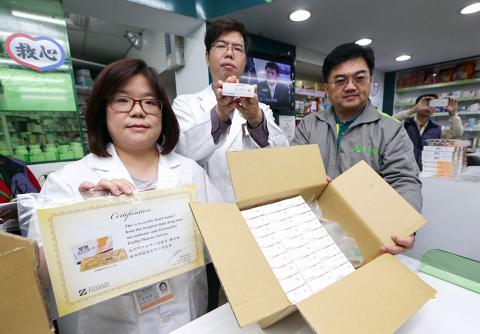Counterfeit batches of Crestor brand lipid-lowering drugs contained ingredients from Chinese pharmaceutical producers, Minister of Health and Welfare Chen Shih-chung (陳時中) said yesterday after being subjected to a barrage of questions from a lawmaker.
A recall was issued on Tuesday for all of AstraZeneca’s Crestor tablets following a discovery last week that two batches of the drug prescribed to 570,000 National Health Insurance patients were counterfeits made from atorvastatin, a cheaper drug whose patent had expired.
The Ministry of Health and Welfare did not release any information regarding the quantity, distribution or origin of the fake drugs until yesterday, when Democratic Progressive Party Legislator Liu Chien-kuo (劉建國) grilled Chen on the issue during a legislative session.

Photo: CNA
Following Liu’s questions, Chen said that the fake drugs’ ingredients were mailed from China to Taiwan, but the identity of many individuals involved in their production and distribution remained unknown to authorities.
The ministry is considering sending investigators to China, Chen said, adding that judicial authorities have taken charge of the investigation.
Liu said that the majority of the imported products seized by the Food and Drug Administration at customs offices for being counterfeits or failing to meet safety standards originated in China.
Separately yesterday, Premier Lin Chuan (林全) pledged to comprehensively overhaul the nation’s drug safety standards during a meeting he chaired at the Executive Yuan.
“This incident is a test for our entire medical safety system and especially for the ministry’s agencies responsible for protecting the nation’s drug safety, as it will show whether their work has won the public’s trust,” Lin said. “We must use this opportunity to completely re-evaluate our performance.”
The primary suspect involved in counterfeiting the drug has been apprehended, Lin said, acknowledging the efforts of police, prosecutors and the ministry to hold the suspect accountable.
The government has requested the assistance of the pharmaceutical sector in recalling and replacing the affected products, he added.
The ministry must ensure the complete recovery and destruction of the fake drugs, and it must make information available to avoid an unnecessary panic, Lin said, adding that an inspection of all commonly prescribed and high-value pharmaceuticals would begin immediately.
Lin said the Cabinet would at the earliest opportunity review existing procedures, including those for dealing with fake drugs; tracking the production and distribution of medicines; quality control regulations; hospital inventory inspections; the mechanism for reporting fake drugs; and methods for their disposal.
The government must protect the public’s access to safe medicines that are essential for public health, uphold the nation’s reputation for effective regulation of medical products and restore public confidence in the government, he added.

A magnitude 7.0 earthquake struck off Yilan at 11:05pm yesterday, the Central Weather Administration (CWA) said. The epicenter was located at sea, about 32.3km east of Yilan County Hall, at a depth of 72.8km, CWA data showed There were no immediate reports of damage. The intensity of the quake, which gauges the actual effect of a seismic event, measured 4 in Yilan County area on Taiwan’s seven-tier intensity scale, the data showed. It measured 4 in other parts of eastern, northern and central Taiwan as well as Tainan, and 3 in Kaohsiung and Pingtung County, and 2 in Lienchiang and Penghu counties and 1

FOREIGN INTERFERENCE: Beijing would likely intensify public opinion warfare in next year’s local elections to prevent Lai from getting re-elected, the ‘Yomiuri Shimbun’ said Internal documents from a Chinese artificial intelligence (AI) company indicated that China has been using the technology to intervene in foreign elections, including propaganda targeting Taiwan’s local elections next year and presidential elections in 2028, a Japanese newspaper reported yesterday. The Institute of National Security of Vanderbilt University obtained nearly 400 pages of documents from GoLaxy, a company with ties to the Chinese government, and found evidence that it had apparently deployed sophisticated, AI-driven propaganda campaigns in Hong Kong and Taiwan to shape public opinion, the Yomiuri Shimbun reported. GoLaxy provides insights, situation analysis and public opinion-shaping technology by conducting network surveillance

‘POLITICAL GAME’: DPP lawmakers said the motion would not meet the legislative threshold needed, and accused the KMT and the TPP of trivializing the Constitution The Legislative Yuan yesterday approved a motion to initiate impeachment proceedings against President William Lai (賴清德), saying he had undermined Taiwan’s constitutional order and democracy. The motion was approved 61-50 by lawmakers from the main opposition Chinese Nationalist Party (KMT) and the smaller Taiwan People’s Party (TPP), who together hold a legislative majority. Under the motion, a roll call vote for impeachment would be held on May 19 next year, after various hearings are held and Lai is given the chance to defend himself. The move came after Lai on Monday last week did not promulgate an amendment passed by the legislature that

AFTERMATH: The Taipei City Government said it received 39 minor incident reports including gas leaks, water leaks and outages, and a damaged traffic signal A magnitude 7.0 earthquake struck off Taiwan’s northeastern coast late on Saturday, producing only two major aftershocks as of yesterday noon, the Central Weather Administration (CWA) said. The limited aftershocks contrast with last year’s major earthquake in Hualien County, as Saturday’s earthquake occurred at a greater depth in a subduction zone. Saturday’s earthquake struck at 11:05pm, with its hypocenter about 32.3km east of Yilan County Hall, at a depth of 72.8km. Shaking was felt in 17 administrative regions north of Tainan and in eastern Taiwan, reaching intensity level 4 on Taiwan’s seven-tier seismic scale, the CWA said. In Hualien, the